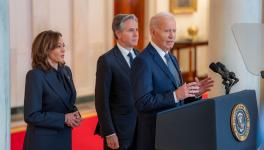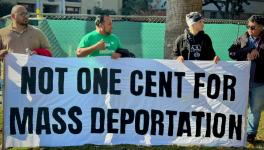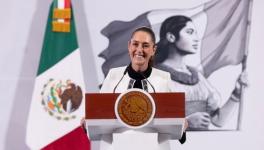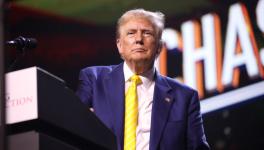How to Take Liberties with Truth Like PM Modi

Image Courtesy: The Indian Express
Prime Minister Narendra Modi’s recent trip to Goa revealed his penchant for misstating historical facts again. On 19 December, Goa Liberation Day, he claimed that the Mughals ruled over “other major parts of India” when “Goa came under Portuguese rule”. It perhaps confirms the cliche about how old habits die hard. There was a 16-year gap between the Portuguese conquest of Goa in 1510, which preceded the Mughal empire established in 1526. That was the year the first Mughal, Babur, defeated the forces of Ibrahim Lodi at Panipat.
The Prime Minister’s speech-writers clearly do not feel the need to cross-check their facts. The incorrect statements he makes certainly do not add to the glory of the office. Two years back, on the 620th birth anniversary of the 15th-century mystic poet Sant Kabir, Modi conflated a five-hundred-year period into a single moment when he said Baba Gorakhnath from the 11th century, Kabir, and Nanakdeva from the cusp of the 16th century used to “discuss spirituality”.
Nobody would accept that the Prime Minister’s speech-writers were at fault in each instance. However, they can be the whipping boys each time Modi takes liberties with the truth and gets ridiculed for it.
After all, when Modi was the Gujarat chief minister, he got many things, put mildly, factually incorrect. In a 2013 speech, he claimed that Syama Prasad Mookerjee was a “great son of Gujarat” who “built India House in London”. In fact, Shyamji Krishna Varma was the patron-founder of India House, which came up in the tumultuous period around the Partition of Bengal in 1905. Modi also claimed that [Mookerjee] held regular dialogues “with Vivekanand and Dayanand Saraswati”. Then he appropriated credit for bringing the mortal remains of Mookerjee to India from Geneva “in 2003”.
Varma, from Kutch Mandvi, was a revolutionary lawyer who made India House as a hostel for Indian students at first, then a refuge for freedom fighters. He died in Geneva in 1930, whereas Mookerjee—the one Modi alluded to in his speech—was born in 1902 in undivided Bengal, a Hindu Mahasabha leader and founded the Jana Sangh, the political arm of the RSS.
Modi’s words were even more incredible at a rally in Patna in 2013. He said the Macedonian conqueror Alexander was defeated by Biharis in Bihar when the real Alexander had never crossed the Beas river. Modi also said Taxila in modern-day Pakistan had a glorious history in Bihar. He said the founder of the Mauryan Empire, Chandragupta, belonged to the Gupta dynasty. Never mind his false claims related to modern history, for example, that Nehru did not attend Sardar Patel’s funeral or the persistent attempts to paint the Patel-Nehru relationship as adversarial.
In “Nehru Abhinandan Granth: A Birthday Book” produced in 1949 by an editorial board headed by first President Rajendra Prasad to mark the sixtieth year of Nehru’s birth, Patel wrote a two-page complement to Nehru. Patel refers to Nehru as a national idol and hero of the masses. He clarifies, “Contrary to the impressions created by some interested persons and eagerly accepted in credulous circles, we [Nehru and Patel] have worked together as lifelong friends and colleagues, adjusting ourselves to each other’s point of view as the occasion demanded and valuing each other’s advice as only those who have confidence in each other can.”
In his book, Mahatma Gandhi Purnahuti, Pyarelal, Mahatma Gandhi’s secretary, also records his views on what Patel thought about Nehru. In the fourth volume, Pyarela writes, “Three months before his death, Sardar Patel said, ‘Our leader is Pandit Jawaharlal Nehru. Bapu appointed him his heir and successor during his lifetime and even declared it. It is the duty of the soldiers of Bapu that they abide by his orders...it is unimportant what my place is. I only know that I am that very place where Bapu asked me to stand.”
Thanks to Modi’s seemingly incurable habit of getting history wrong, the country has developed a distorted image of Nehru and done injustice to Patel’s persona, other than the widespread abuse of the discipline of history. Had wiser counsel prevailed, Modi would not have held the Congress party solely responsible for the partition. Patel was part of the triumvirate that included Gandhi and Nehru, which played a vital role in the tumultuous days preceding independence.
It is disturbing that specious claims about events, individuals and communities are not limited to the ancient and medieval past alone. Modi’s speeches have unleashed distortions on the immediate past and, so to speak, the present continuous too. Remember how the Prime Minister described the phasing out of Rs.500 and Rs.1,000 currency notes? He said it was a panacea for every ill plaguing the economy, from black money to terrorism in Kashmir. Those claims proved humbug within weeks, if not days, as demonetisation destroyed the informal economy, and its aftershocks persist.
In his address to the nation defending the dilution of Article 370 of the Constitution in Jammu and Kashmir, the Prime Minister said the provision hinders progress and integration of the region. His other dubious claim was that Jammu and Kashmir lags behind other Indian states in health, education and other social services. The facts proved contrary all over again.
Modi and many in his party flatly denied holding discussions on the National Register of Citizens (NRC) when the evidence showed his Cabinet colleagues had pushed for it even in Parliament. Even claims that electoral bonds will make political funding more transparent are the exact opposite of reality. His government refused to accept that China intruded into Indian territory despite evidence from satellite imagery and multiple media reports contradicting this.
It’s easy to call these make-believe statements a Goebbelsian strategy to repeat untruths until they sound authentic. The more urgent question is why people do not see the chasm between claims and reality. Indeed, many are underlining the “fire-hosing of falsehood” (like in Vladimir Putin’s Russia), even offering ways out. Indians could even learn from the critics of United States President Donald Trump, whom they roasted for his lies (and who called Modi a “true friend”).
In December 2016, a Business Insider columnist Linette Lopez wrote about Trump’s lies, recounting him telling Americans his predecessor Barack Obama founded the ISIS, that thousands of Muslims in New Jersey celebrated 9/11, and that he won the popular vote he had lost by millions of votes. “For a lie to work, the liar must also be believed,” she explained. Citing various experts, she points out that people believe lies when “desperate to be in control” or feeling vulnerable. ‘The lesser control people have over their lives, the more likely they will be to try and regain it through mental gymnastics,’ one of the experts, Adam Galinsky, a professor at the Kellogg School of Management, told her. “Donald Trump...captured the imaginations of many people who felt vulnerable about the past, present and future.”
It is a feeling many Indians would easily relate to. For, the falsities of members of the ruling regime also rest on a bed of fear—ones they have created.
The author is an independent journalist. The views are personal.
Get the latest reports & analysis with people's perspective on Protests, movements & deep analytical videos, discussions of the current affairs in your Telegram app. Subscribe to NewsClick's Telegram channel & get Real-Time updates on stories, as they get published on our website.
























